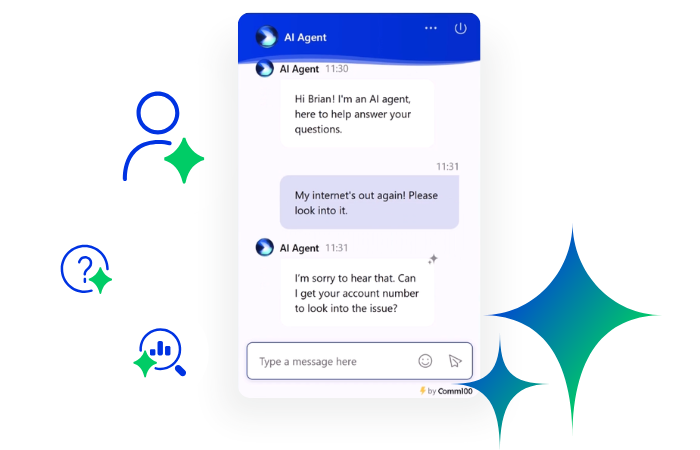Key performance indicators (KPIs) are measurements that show how effectively a company is achieving its goals. KPIs can be used to measure the success of a company’s customer service strategy, the quality and effectiveness of its support, how well its agents are performing, and more.
Measuring KPIs is like taking your car to the mechanic. Sometimes you do it to diagnose a specific problem, while other times you do it to make sure that everything is running smoothly and see what could be improved. As a manager, it is your responsibility to assess your company’s KPIs and use your findings to make any appropriate adjustments to your live chat team. But with so many performance indicators to consider, how do you know where to begin?
Here are the top 5 must-watch KPIs that will be most useful to the ongoing development and improvement of your live chat team.
1. Number of chats
Analyzing the number of chats may seem too simplistic, but it can tell you a lot. Here are a few things to look for when studying this metric:
• How many chats are agents accepting as opposed to rejecting or passing to other agents? This will reveal agent work ethic, confidence, and performance.
• Is your live chat count lower or higher than what your company is aiming for? If it’s lower, you may need to alter visibility and placement, or even introduce a pro-active chat strategy.
• What is your number of missed chats? If it’s high, you may need to add staff during peak busy times. Alternatively, you may need to check average handle time as it could indicate that your agents are spending too much time on each chat.
• What is your number of offline chats? If this is high, you may need to shift operating hours or add a 24/7 chatbot to answer these offline chat requests.
2. Agent utilization rate
Agent utilization rate reveals the percentage of time that agents are spending in live chats, wrap-up, and other productive functions, as opposed to in “away” mode or offline. It can be measured as follows:
Amount of live chats per month x Average Handle Time
—————————————————————
Hours worked in a month x 60mins
Typically, a 50% to 60% benchmark is good to aim for. A utilization rate that is too low might be indicative of problems like overstaffing and poor agent training. Similarly, a utilization rate that is too high may result in rushed chats, mistakes in documentation during wrap-up, negative customer feedback, and agents who are stressed out.
First contact resolution, or FCR, indicates whether a customer’s issue has been resolved during their first contact with your company – in this case, within a single live chat session. Increasingly, FCR is being recognized as one of the most (if not the most) important metrics to watch in customer service.
Customer satisfaction ratings have been shown to be 35-45% lower when a second call must be made for the same issue. It also helps reduce queue wait times as customers won’t have to come back for help again. First contact resolution can be tricky to calculate. If the issue is resolved as a transfer, does it still count as first contact resolution? The consensus is generally no. What if an agent marks a customer issue as resolved the first time, but the customer disagrees? Again, typically no. One way you can measure FCR effectively is to ask customers in the post-chat survey if their issue was resolved the first time.
4. Customer satisfaction
Customer satisfaction (CSAT) is a metric that is vital to determining the success of your live chat team and the quality of company procedures, policies, and products. Customer satisfaction can be measured in several ways, but here are the best options:
• Net Promoter Score (NPS) is an index that measures a customer’s willingness to recommend the company’s products and services to others.
• Customer effort score is a score built by a single-question survey that asks if the company made it easy for the customer to handle his or her issue.
• Loyalty measurements examine whether customers have remained loyal to your brand or are starting to shop with the competition.
• Customer satisfaction surveys are surveys about the customer experience which can be delivered through post-chat pop-ups, emails, customer interviews, focus groups, and more.
Post-chat customer satisfaction surveys are often considered the best option as it provides a more consistent and accurate spectrum of feedback by making sure that you don’t only receive feedback from customers who had a really great experience or a really terrible experience.
5. Average handle time
Average handle time, or AHT, is a classic measure for evaluating agent performance and refers to how long each agent spends on a chat on average. By measuring your agents’ AHT, you can help enforce speedy and concise resolution of customers’ issues. The average handle time can be measured as follows:
AHT = Total chat time + total wrap-up time number of live chats handled
In order to balance customer satisfaction and a speedy resolution, you may want to try aiming for an average handle time of 14 or 15 minutes. Keep in mind however, that average handle time varies greatly by industry and by types of queries handled. We have seen some companies work with an ideal AHT of as low as 4 minutes, and others who aim for 20! Take a look at your industry’s stats in this Live Chat Benchmark Report 2020 to see how your team should be performing compared to your peers.
This blog is taken from the full eBook – The Ultimate Guide to Managing a Successful Live Chat Team. Download below to learn how to build or restructure a top-performing team and take your results to the next level with cutting-edge technology.
Powerful live chat software
Offer real-time, personalized, efficient support that your customers and agents will love at 1/3 the cost of voice support.
Learn more
Comm100 Live Chat







